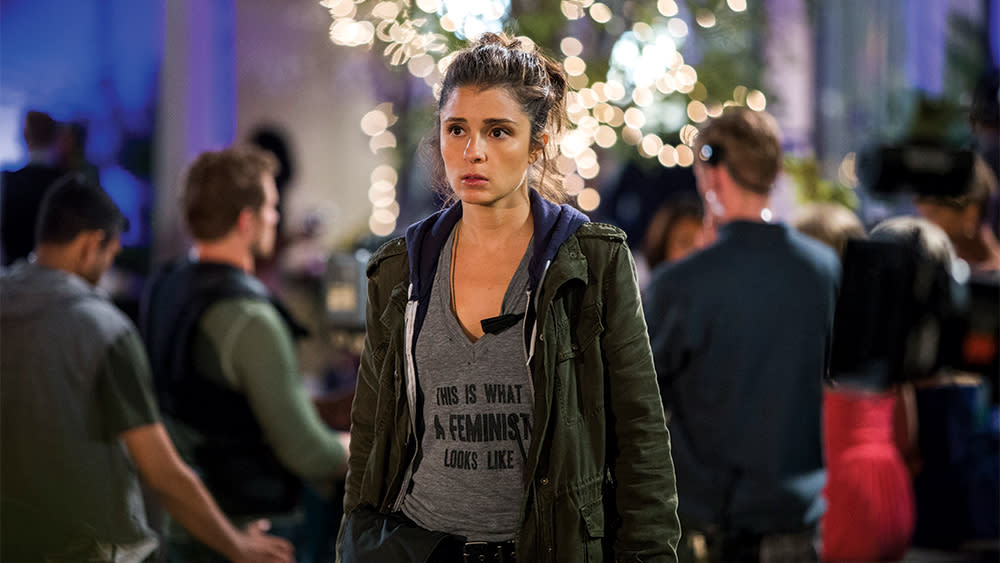It’s Up to Men in Power to Take the First Step Toward Diversity in TV

Lifetime’s acclaimed summer drama “Unreal” opened with a memorable image: Shiri Appleby’s character, Rachel, the producer of a reality dating show, “Everlasting,” was sprawled on the floor of a limousine, surrounded by the show’s contestants and trying to avoid the cameras. Rachel’s face revealed her conflicting emotions as she listened to the contestants chatter, and her T-shirt bore the slogan, “This is what a feminist looks like.”
The message was both ironic and not; “Everlasting’s” producers, played by Appleby and Constance Zimmer, may have had mixed feelings about the state of their personal and professional lives, and how they did or didn’t reflect feminist ideals, but the thoughtful depictions of both women certainly merited the use of the term.
The point is: Sometimes you find feminists where you least expect them. In recent years, when the lack of movement on equality for women in front of and behind the camera has induced a frustration migraine, it’s worth remembering there are men in the industry who would look appropriately dressed in a T-shirt like Rachel’s.
There’s Ronald D. Moore, who adapted a property about an adventurous, complicated woman for television, and when it came time to film the most crucial “Outlander” episode — Claire’s wedding to the Scottish rebel Jamie — he put the episode in the hands of a female writer (Anne Kenney) and a female director (Anna Foerster). The result was an exploration of sexuality and intimacy that felt fresh and exciting to many viewers, mainly because it didn’t rely on tired visual tropes and sexist assumptions.
I can’t forget an illuminating story from a female writer for a one-hour show, which I will keep confidential at her request. Every year, male writers pitch a storyline that involves a female character being sexually assaulted. “I have to stomp my foot in the writers’ room and say no, which I probably shouldn’t do, for the sake of my career, but dammit, no,” she told me. “If rape were so illuminating, such a great story, then they’d be pitching to rape the men. But that never happens and never will.”
Of course, rape can be portrayed responsibly on screen (I can name a half-dozen shows that have explored the idea with sensitivity). But in general, TV goes to that well with female characters far too often, usually with cliched, superficial and frustrating results. But in that writers’ room, the woman who repeatedly questions that pitch doesn’t feel isolated. And that’s the difference between simply hiring a token woman or two — and having a balanced, diverse staff full of people who feel heard and respected.
Valuing women in front of the camera matters, too. Pete Nowalk, creator of “How to Get Away With Murder,” and Kenya Barris, creator of “Black-ish,” have given Viola Davis and Tracee Ellis Ross wonderfully juicy, high-profile roles. Those shows, along with “Fresh Off the Boat,” “Scandal” and “Empire,” have proved (once again) that viewers will flock to characters who make them laugh and gasp and think — and who look like an America that is 37% non-white.
The difficulties of women in the TV industry who have to face big and small examples of sexism every day shouldn’t be minimized; they’re the ones fighting the daily battles. But we can’t ignore the stats: In the 2013-2014 TV season, 85% of those holding the title “executive producer” were male, according to the Writers Guild. If the TV industry is going to truly change, men will need to be at the forefront of that evolution.
It’d be easy to go online and just buy one of those T-shirts. But let’s hope there are men who are willing to earn it.
Related stories
TV Review: 'The Jacksons: Next Generation'
TV Review: 'Murder in Mexico: The Bruce Beresford-Redman Story'
Lifetime Renews 'Devious Maids' for Season 4
Get more from Variety and Variety411: Follow us on Twitter, Facebook, Newsletter
